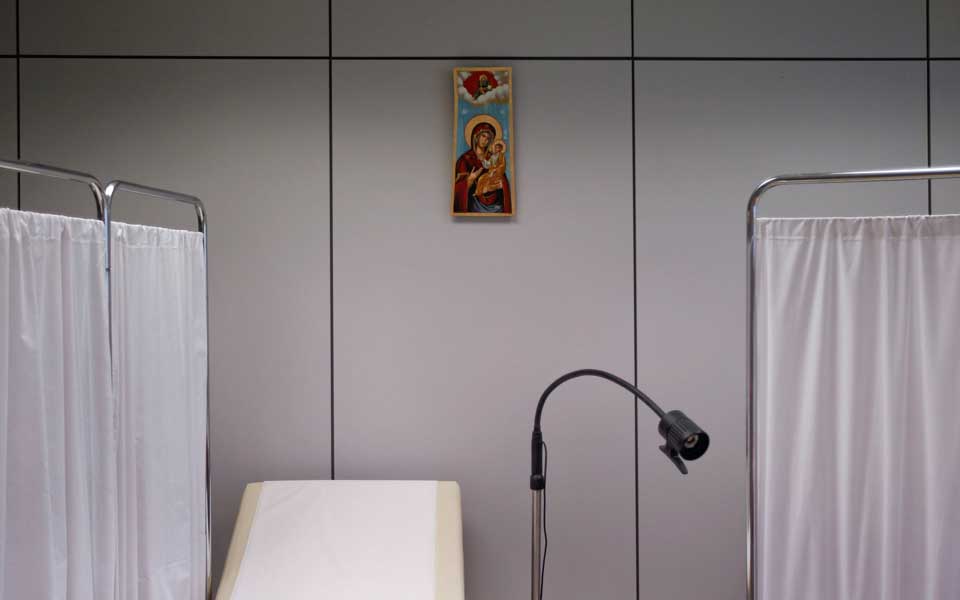Survey records complaints of doctors, nurses in Greece’s cash-strapped hospitals

At any outpatient department in any Greek hospital you will find dozens of patients waiting to be examined and the chances of an angry outburst aimed at one of the overworked staff are always pretty likely. Hospital staff also face other pressures at work that are not related to patients but arise from the tension of the job and working in close proximity with other colleagues, often leading to cases of bullying and malicious gossip, with one in two saying they are unhappy at work and would like to get a job abroad.
The difficulties of working at a Greek hospital were the subject of a recent survey on the Greek healthcare system conducted by the Greek Medical Association UK in cooperation with researcher Efi Simou from the Department of Epidemiology and Biostatistics at Greece’s National School of Public Health.
A total of 1,339 respondents – doctors, for the most part, and nurses – filled in electronic questionnaires between December 2014 and March this year. Of the sample, 33.1 percent were working at private hospitals, 31.9 percent at public hospitals and 25 percent at university hospitals.
A worrying 44.3 percent of the respondents claimed that they were not at all or only a little satisfied with their career prospects, followed by 44.2 percent who were “quite satisfied” and 11.5 percent who were “very satisfied.” At least half were positively inclined to seeking work abroad, with 30.3 percent saying that they saw such a prospect as being “very positive” and 26.3 percent as “quite positive.” Only one in six, or 15.2 percent, of respondents were against the idea. The percentage of those who would consider starting their own business was also high, at 54 percent.
Approximately half the women who participated in the study said that they didn’t feel they were given the same opportunities as their male counterparts when it came to specialization. Specifically, 31 percent said that they could have had more opportunities and 17.2 percent clearly stated that they were discriminated against because of their gender. In the department of surgery, gender discrimination seemed to be even worse, with just 28.8 percent of female respondents saying they had the same opportunities as their male colleagues.
Meanwhile, one in three men (34.2 percent) and two in five women (42.2 percent) said they had experienced bullying and intimidation in the workplace.
On the issue of sexual harassment, 34.2 percent of female respondents said they had been victims, compared to 9 percent of the men, while 58.6 percent of the women said they had been the subject of malicious gossip, compared with 50.4 percent of the men.
Humiliation and ridicule was identified as a problem for 35.4 percent of the women and 30 percent of the men, while 34.5 percent of the female respondents said they felt excluded by their colleagues, compared with 28.5 percent of the men.
The study clearly indicates that Greek hospitals have inadequate support mechanisms for staff, with just two in 10 respondents saying they had received some form of support following victimization and the remainder saying that they had received support only occasionally and most often from other colleagues.
Commenting on the findings of the study, the head of the Greek Medical Association UK and a PhD candidate at Imperial College London, Gregory Makris, said that “gender discrimination and bullying should not be tolerated in any work environment and particularly in a sensitive and important sector such as that of healthcare, where such behavior between colleagues could easily be passed on to the doctor-patient relationship.”
Makris noted that they survey was aimed at detailing the magnitude of the problem and said he believed that “it can and should act as a wake-up call for the Ministry of Health and medical and nursing associations so that they further investigate these issues as part of a broader need to improve working conditions and training at Greek hospitals.
“Anything less would show that they are simply indifferent or in part responsible for a situation that is an affront to all of us.”





